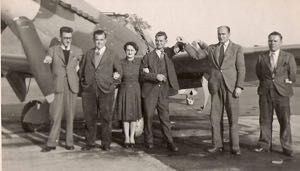
Phyllis Grimes - RAF aircraft mechanic
By Chantelle Creech
Page added 3rd July 2020
Return to Exeter People Menu
Phyllis Grimes
Phyllis Grimes worked at Exeter Airport as an Aircraft Mechanic throughout WW2. Phyllis' son Bob Waddell, reminisced on memories of his inspirational mother and told me that she began her career training at Bristol Airport. During her time at Exeter Airport, she worked on the Spitfires. The Supermarine Spitfire, also known as the most famous fighter of British World War Two and was a popular aircraft at the airport at this time.
Phyllis was only 4" 11, however, she famously used this to her advantage as she was the only one able to crawl into the smallest parts of the aircraft unlike her fellow colleagues.
Prior to 1939, Exeter Airport operated a range of civilian flights, as well as a flying club with more than 300 members, however, the outbreak of war changed the airport entirely.
Exeter airports purpose at this time was to assist the military during war from 1939 to 1947. The airport became an RAF base and it played a vital role during some of the crucial moments in World War II.
The South West Airfields Heritage Trust campaigned for five years to create a memorial at Exeter Airport to mark the important role that the military airfield played during WWII. The bronze life-sized statue consisted of a Battle of Britain pilot scanning the sky for his missing comrades.
Exeter City Council provided five thousand pounds for the project and an additional eight thousand pounds was donated by The Polish Air Force Association, as well as other local benefactors. The statue remains today and still stands at the front of the airport terminal building. It continues to remind us of those who served at RAF Exeter during that period, and includes a brief history of the airfield during the war years.
Devon County Council, Jeremy Yabsley, said: "The role that this airport played as a base for strategically defending the southwest should not be forgotten and neither too should all the air men and women involved in the many campaigns that operated in and out of this base."
Without people like Phyllis history simply wouldn't be the same and therefore I believe that she and so many others should be celebrated for their contributions and efforts to the aviation industry. Once the Global pandemic comes to an end, it would be great to see an increase in women working within aviation. The sky is literally the limit.
I would like to thank David Cornforth, Bob Waddell and the members of Exeter Memories for your images and information.

Phyllis Grimes, third from left.
| Top of Page |